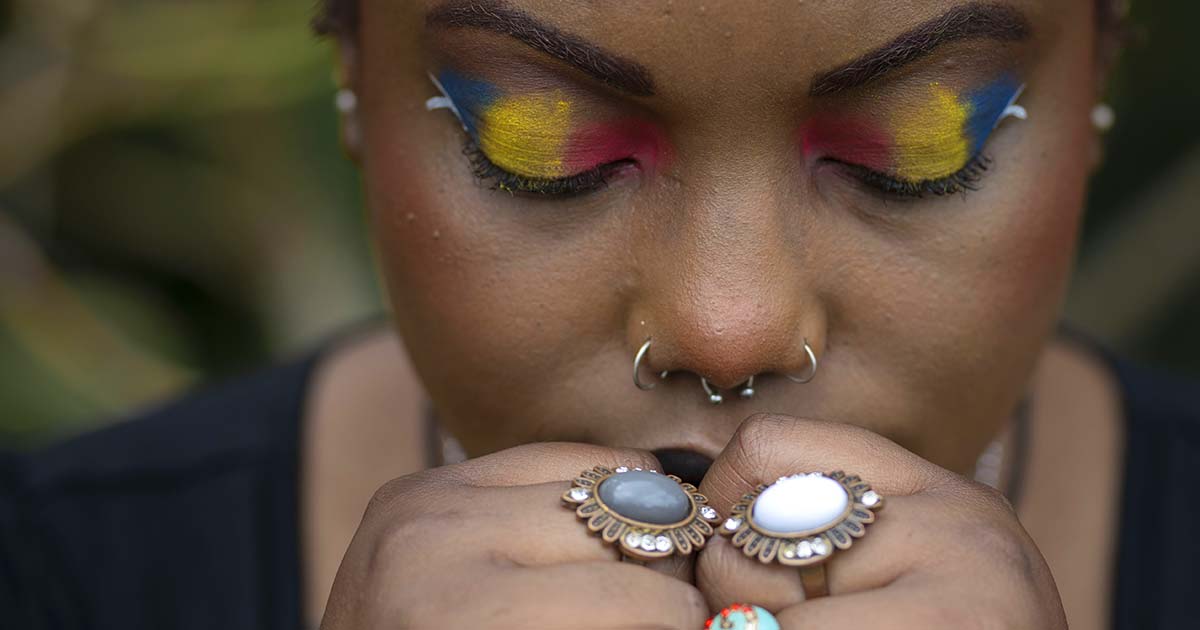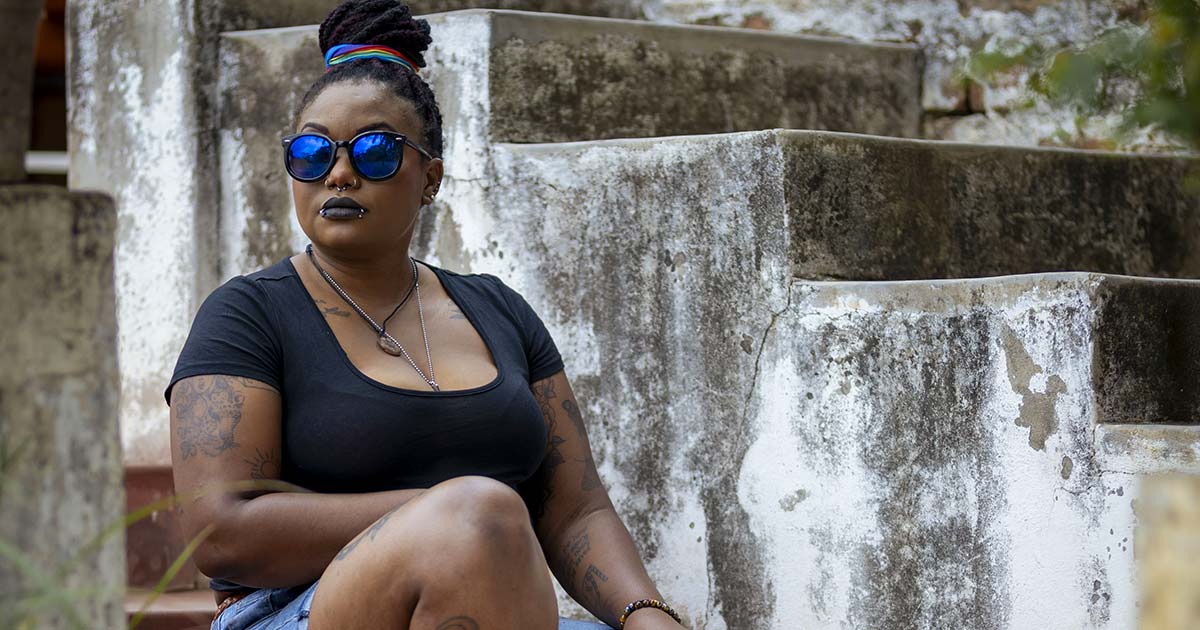Redefining Home and Belonging As a Non-Binary Person in Malawi

Shassy, an artist, photographer and writer, says that living in Malawi as a non-binary person can be challenging as they’re often reminded that their identity doesn’t fit into society’s binary expectations
The discovery of my being started at a very young age. I did not follow, nor did I respect the rules and customs of Malawian tradition and I did not always have a high femme attitude as a young person despite being assigned female at birth.
When I was 22 and living in Johannesburg, South Africa, I started attending support groups and joined communities of gender-diverse people which led me to the realisation that I was indeed, non-binary. I moved back to Malawi at the age of 27, after I had made changes to my pronouns, left my deadname for good and was then living as a full-blown non-binary individual.
As a non-binary person living in Malawi, navigating life has been both a journey of self-discovery and a challenge within a societal context that often adheres strictly to traditional gender norms. Malawi, like many other African countries, has deeply rooted cultural and religious beliefs that often shape societal attitudes towards gender identity and expression.
In my early years in Malawi as a pre-discovered non-binary person, I encountered various experiences that shaped my understanding of gender identity and expression. From a young age, I felt a disconnect between the expectations placed on me based on my assigned gender at birth and the way I felt internally.
For example, I was expected to kneel to greet my elders and especially men. The moment I felt puzzled and not inclined to respect this tradition, I knew something was amiss. This internal conflict is a common experience for many non-binary individuals, as we often do not fit neatly into the binary categories of male or female and usually do not feel aligned with the gender roles expected of us.
One of the challenges of being non-binary in Malawi is the lack of widespread understanding and acceptance within broader society. Gender identity is often conflated with biological sex, and there is a limited vocabulary to discuss and express non-binary identities in Chichewa, our local language. This has led to misunderstandings, misgendering, and a sense of invisibility for myself as a non-binary individual and invisibility is one thing that I never want to feel, especially when I am home.
The LGBTQIA+ Landscape in Malawi
Despite many challenges, there is a growing movement towards LGBTQIA+ visibility and rights in Malawi. Organisations and activists are working tirelessly to educate the public, challenge discriminatory laws, and create safe spaces for LGBTQIA+ individuals.
In 2009, when the case of a transgender woman, Tiwonge Chimbalanga, who faced persecution for her identity, sparked national and international conversations about LGBTQIA+ rights in Malawi, I was living in Palestine at the time attending school as a privileged 17-year-old. I had heard the news through my parents and they tried to tell me not to talk about ‘these things’ around my seven-year-old sister. I found it very odd because I believed it was important for her to know that there are not just male and female genders in the world.
As a non-binary person, finding community and support has been crucial in my journey. Connecting with other LGBTQIA+ individuals and allies has provided a sense of belonging and validation. Social media and online platforms have also been instrumental in connecting us with global LGBTQIA+ communities and resources.
A significant moment in the LGBTQIA+ rights movement in Malawi was when then-President Joyce Banda stated her intention in 2012 to repeal the laws criminalising consensual same-sex relations. This promised legal change, however, has sadly still not materialised.
Jana Gonani, a transgender woman jailed in 2021 for having sex with a man under the anti-homosexuality laws, has challenged the constitutionality of her conviction. On 28 June 2024, the High Court ruled that the ban on same-sex intimacy is constitutional and upheld the legal provisions criminalising homosexuality.
On a more positive note, in 2021, history was made when my country held its first LGBTIQ+ Pride march in the streets of the capital Lilongwe.
Coming Out as Non-Binary
In my personal life, coming out as non-binary has been a gradual process, influenced by factors such as safety, acceptance within my social circles, and personal readiness. While I have faced challenges, disrespect and misconceptions, I have also experienced moments of acceptance, understanding, and growth.
I came out first to my little sister who was 12 years old at the time. I sat her down and explained what being non-binary is about and why I identify with it. She took it well and understood what I had said as I was already out to her as a pansexual person. I told my little sister that I would like to be referred to with the pronouns: they/them, which she abides by. My other sisters and my mother, on the other hand, still struggle with the concept of my being non-binary and have a hard time respecting and using my pronouns as I have advised.
I feel invisible when people don’t respect my non-binary pronouns which is a deeply disheartening experience. It’s as if my very existence is being erased, reduced to an uncomfortable silence that lingers in the air. Each time someone misgenders me or dismisses my identity, it feels like a small but significant part of who I am is being ignored or invalidated.
This lack of recognition isn’t just a minor oversight; it’s a constant reminder that my identity doesn’t fit neatly into the binary expectations that society imposes. It creates an emotional chasm, where I find myself isolated, yearning for the basic acknowledgement that others receive without question.

An Outsider in My Own Life
The struggle to assert my pronouns repeatedly can be exhausting, turning everyday interactions into potential sources of stress and anxiety. It’s a weight that bears down on me, knowing that despite my efforts to live authentically, there are those who still choose to overlook or dismiss my identity.
This invisibility makes me feel like an outsider in my own life, highlighting a gap between how I see myself and how the world perceives me. Ultimately, the consistent disrespect of my pronouns chips away at my sense of self-worth and belonging, often making the quest for acceptance and recognition feel like an uphill battle.
Education and awareness play a crucial role in fostering acceptance and inclusivity for non-binary individuals in Malawi. By promoting conversations about gender diversity, challenging stereotypes, and advocating for policies that protect LGBTQIA+ rights, we can create a more inclusive society where everyone’s gender identity is respected.
There is still much work to be done to ensure full equality and acceptance for non-binary individuals in Malawi. This includes advocating for legal protections against discrimination based on gender identity, promoting LGBTQIA+ inclusive education, and amplifying the voices of non-binary and transgender individuals in all aspects of society.
Living as a non-binary person in Malawi is a complex and evolving experience, shaped both by challenges and progress. It has been a journey of self-discovery, resilience, and hope for a more inclusive and equitable future for all gender identities.
Shassy is a black, pansexual, non-binary extraordinary individual who has dedicated their life to better the lives of queer Malawians so they can also feel free to express and find themselves. They are an artist, photographer, writer and overall find themselves living a unique life.
This article was made possible with the support of the Other Foundation. The views expressed herein do not necessarily represent those of the Other Foundation. www.theotherfoundation.org.
©2024 MambaOnline. This article is licensed under a Creative Commons Attribution-NoDerivatives 4.0 International License. You may republish this article, so long as you credit the authors and MambaOnline, and do not change the text. Please include a link back to the original article.
Leave a Reply